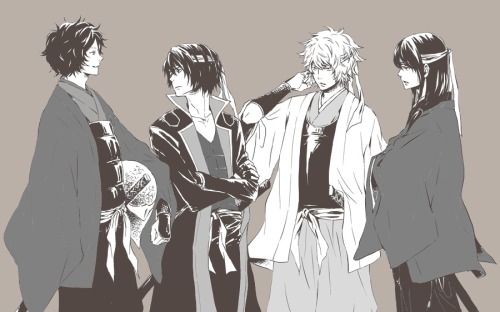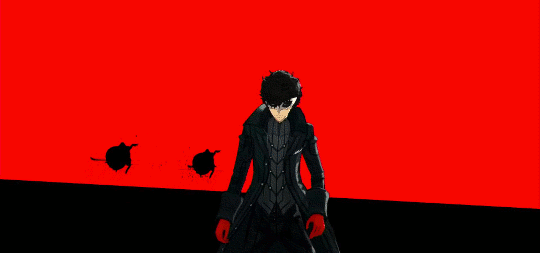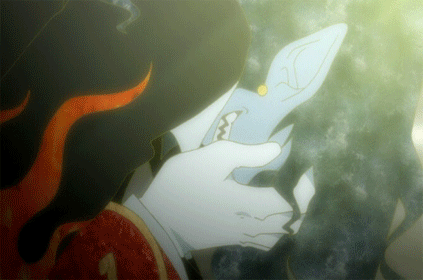.... *throws a shoe*
More specifically, VN adaptations not condensed into one series are something else. The Steins;Gate and Higurashi adaptations, for example, didn't turn into disorganized messes like the series of Fate adaptations have. DEEN's 2006 adaptation gets a lot of flack for trying to combine the routes into one series, but I 100% understand why they did it. So that this current situation wouldn't happen.
I'm not sure exactly when I plan on watching them. Definitely after UBW, that's for sure. I have other shows on my plate right now before getting to Kara no Kyoukai

Fate/Stay Night: Unlimited Blade Works (2014)
#1181

Posted 31 May 2015 - 10:16 PM

Joui Four
#1182

Posted 31 May 2015 - 10:29 PM
.... *throws a shoe*
You hit me ![]()
#1183

Posted 31 May 2015 - 10:32 PM
Funnily enough though, Fate/Zero requires viewers to have less prior knowledge going in than F/SN UBW does. Fate/Zero makes sense on its own as a standalone, while UBW doesn't. That makes this whole mess even more problematic.
First, F/Z is not a standalone, it's a prequel, it's supposed to be watched/read after F/SN
Kind like the Star wars movie series
- I want to go back and transcribe the exact lines of dialogue they used to better support my point, but that'd take way too long, and I admit I'm too lazy to do it. So I guess I'll drop this part for now.
- "Shirou acknowledges that his ideal is an impossible one from the beginning but at the same time he is peeved by it and doesn't want to give up because he believes in the end he would be able to do it."
I got that. Problem is, Archer is standing right there proving him wrong. Proving that he wouldn't be able to do it. He is staring at physical evidence. Yes, you address this in the next quote I cite, but I wanted to do this step-by-step.
"Shirou acknowledges this, he acknowledges that he won't ever be able to uphold this ideals completely, they are after all an utopia, however he won't stop following them, not because he is "the protagonist!" or something like that, but it's because it's a beautiful wish he inherited from his father, in short UBW Shirou will never regret his actions doen while upholding these ideals because for him the value is on the journey and not on the destination"
So the moral here is to follow your dreams and give into childish naivete, even if it only ends up making things worse, because... the current you thinks it's a nice idea, and enjoying the journey is more important than the destructive destination? To ignore criticism? To keep believing in what you believe in, even if you've basically been proven 100% wrong?
I reiterate: that's just plain stupid. People chalk it up to dumb shounen junk because that's exactly how it comes across. Hell, it might even come across worse by explicitly saying with its message to ignore criticism, even if it's right.
- Quality characters =/= quality scenes. You can keep the character the same and the events the same as long as it flows naturally and well. This scene didn't. A scene making sense from a character standpoint does not justify sloppiness.
It wasn't bad execution when he didn't end the 4th grail war immediately because there were several mitigating factors, such as the fact that he was restrained by two separate masters and a general plan. Fate/Zero also did a great job of justifying logical inconsistencies with character flaws/traits (minus one or two bizarre instances).
This, on the other hand, called a ton of attention to him being able to end this in one fell swoop and had little to no convincing mitigating factors present to prevent him from doing so. Maybe it made sense for his character to walk out for such a trivial reason, but the way it was handled felt cheap. An easy alteration to the scene which would have fixed this would be to have him not take out Gate of Babylon at all. Have him talking with them, then show the ash/dirt/soot/whatever it was fall from above, then have him say "you know what, you can't stop me even if you try, so I'm not going to even bother considering killing you; you aren't worth getting dirty over" (obviously not word-for-word) and leave. There. Problem solved. Simple fix. The fight isn't built up too much and it flows a lot more naturally instead of ending abruptly and coming across as a cheap way to let our main characters limp out of there alive. Done. Don't have him consider them a threat by taking out Gate of Babylon, and then suddenly change his mind.
- Archer exists because in some universe there is a Shirou that regretted his path, UBWShirou won't become Archer, his path won't be destructive because he won't regret his path. Archer puts value on the destination because his grail war events were events that made Shirou continue the way he was at prologue, it's an undiclosed route, all of the three routes make Shirou develop in different ways, so for different reasons all of the version of Shirou's we see in the three routes won't becom Archer in the future
UBWShirou puts value in the journey, for him just upholding these ideals each day is enough, there is literally 0 chance he will turn into Archer. He did not ignore criticism...didn't you watched? He accepted, however he just didn't let this criticism crush his beliefs, he kept a hold onto himself, Shirou was not proven wrong, Archer was... that was the whole point of the Answer, Archer drowned so much in regret that he forgot why he wanted to uphold those ideals in first place.
People chalk it up to dumb shonen because they simply dont understand, like you just proved you didn't :/
You're not supposed to relate to Shirou in first place, the guy is empty, the only way he feels worth of life is by saving people the same way Kiritsugu did with him, I won't spoil Fate or HF, but in UBW he surpasses this by acknowledging the fact that he is problematic, that his ideal is not even his, it's just that he won't stop doing because it's a beautiful thought, it's something that it's worth following, so if he ends up like Archer ( which he won"t) he won't have any regrets
Here is an analysis from a person who also only watched the anime
Hmm, judging by all the griping about "the Answer", I take it that by that logic, anime-only viewers would have gotten a very wrong, shallow and simplistic understanding of what is a grand and philosophical "answer" to the conundrum of Emiya Shirou's philosophy and philosophy. With this in mind, allow me, a mostly Anime Original viewer and one of those ignorant fools who entered this franchise from the Fate Zero Franchise to put forth what I thought I comprehended from the past two episodes, about Emiya Shirou's character.
Emiya Shirou is a man with a borrowed Philosophy, a Philosophy derived from the ideals Emiya Kiritsugu held in Fate/Zero - the desire to be a Hero of Justice, to save as many as he can. In Fate/Zero, the tainted Grail suggested that the way to accomplish Kiritsugu's wish for peace for all humanity, was to literally grant all humanity the peace of death. As a result of discovering the Evil within the Grail, Kiritsugu ordered Saber to destroy the Grail. The result was the Great Fuyuki Fire, which killed hundreds if not thousands.
Shattered by the events, and the carnage of the aftermath, Kiritsugu desperately searched for a survivor, any survivor, someone to save. He found Emiya Shirou, saved him with the Nobel Phantasm Avalon (which allowed the regeneration of all injuries) and in doing so, Kiritsugu somewhat saved himself by saving at least one person.
Kiritsugu adopted Emiya Shirou. And while being raised by Kiritsugu, Emiya Shirou gradually learned, in a vague, general way, of Kiritsugu's ideals - the whole idea of saving everyone and becoming a Hero of Justice. And so, all that full moon night, Emiya Shirou resolves to follow in Kiritsugu's footsteps, finding beauty in the idea, resolving to become a Hero of Justice.
As a result, Emiya Shirou tries to live his interpertation of what it means to be a Hero of Justice, existing for others, and putting others before himself in pursuit of this ideal he sees as beautiful.
But Archer, the Future Emiya experiences this ideal, and believes that at the end of this extreme ideal of self-denial is futility. One would not only be betrayed, but one can never save everyone in the end. One would keep killing to save others, and in the end, kill more than they may have saved. The ideal is endless, and thankless, and unattainable. In the end, the ideal will break the Individual.
Shirou Emiya on the other hand reaffirms the beauty of the ideal in itself, that the ideal itself is meritorious even if unattainable. But he goes one step further, by arguing even if the cost and the end of the ideal may be tragic in itself, the very journey itself is more than worth it. Even if an ideal is unattainable, it is living out these ideals and experiencing these ideals and saving some even if you can't save all that makes it worth it.
Even if you cannot save all, you can save some, or even one. If the striving of the ideal itself reaffirms it's beauty, despite it's unattainability, then the experience, then the journey itself is very worth the ending. It is the journey that is important, not the ending. The ideal of the Hero of Justice does not achieve fruits in it's ending, but in it's striving. If this is hypocrisy, so be it.
--About the Gil scene
Now you're just nitpicking
What matters if he took the GoB out or not?
Ultimately his resolution in the scene was basically the same you proposed
Edited by Nar123, 31 May 2015 - 10:49 PM.

![]() Persona 5 hype
Persona 5 hype ![]()
#1184

Posted 31 May 2015 - 10:37 PM
My aim was offYou hit me

Joui Four
#1185

Posted 31 May 2015 - 10:40 PM
My aim was off
You also hit me.
G . I . N . T . A . M .A

#1186

Posted 31 May 2015 - 10:49 PM
My aim was off
You also hit me.
COMBO! It bounced off my face and hit the ground around TG95's feet.
#1187

Posted 31 May 2015 - 10:50 PM
You also hit me.

Joui Four
#1188

Posted 31 May 2015 - 10:51 PM
COMBO! It bounced off my face and hit the ground around TG95's feet.

Joui Four
#1189

Posted 31 May 2015 - 10:52 PM
BIG feet.
#1190

Posted 31 May 2015 - 10:58 PM
How did all this happen?!
You were just lucky ![]()
G . I . N . T . A . M .A

#1191

Posted 31 May 2015 - 11:13 PM
First, F/Z is not a standalone, it's a prequel, it's supposed to be watched/read after F/SN
Kind like the Star wars movie series
I was saying it works as a standalone, not that it's meant to be.
- Archer exists because in some universe there is a Shirou that regretted his path, UBWShirou won't become Archer, his path won't be destructive because he won't regret his path. Archer puts value on the destination because his grail war events were events that made Shirou continue the way he was at prologue, it's an undiclosed route, all of the three routes make Shirou develop in different ways, so for different reasons all of the version of Shirou's we see in the three routes won't becom Archer in the future
UBWShirou puts value in the journey, for him just upholding these ideals each day is enough, there is literally 0 chance he will turn into Archer. He did not ignore criticism...didn't you watched? He accepted, however he just didn't let this criticism crush his beliefs, he kept a hold onto himself, Shirou was not proven wrong, Archer was... that was the whole point of the Answer, Archer drowned so much in regret that he forgot why he wanted to uphold those ideals in first place.
People chalk it up to dumb shonen because they simply dont understand, like you just proved you didn't :/
You're not supposed to relate to Shirou in first place, the guy is empty, the only way he feels worth of life is by saving people the same way Kiritsugu did with him, I won't spoil Fate or HF, but in UBW he surpasses this by acknowledging the fact that he is problematic, that his ideal is not even his, it's just that he won't stop doing because it's a beautiful thought, it's something that it's worth following, so if he ends up like Archer ( which he won"t) he won't have any regrets
Here is an analysis from a person who also only watched the anime
Ok. I think I've found the core problem here that's causing us to diverge so much.
Archer is a direct parallel to Kiritsugu (or vice versa, considering the release dates of the source material). He came to the same conclusion: that saving everyone is impossible. Because of this, he was swallowed up in despair. He became who he is because he focused on the endgame. Shirou is not focusing on the endgame, but the process of saving people itself. This makes sense. On its own, this is a nice idea, and a good resolution to come to. It gives him inner peace and prevents him from ever feeling regret. I get that. I understand.
However, this ignores Archer's actions, and their repercussions. Up until now, he's basically been doing what Kiritsugu did: kill the few to save the many. Why is this a problem?
The above scene speaks for itself. Even though the intention to save everyone is a great one, going about it the way Kiritsugu (and Archer) did only results in more death and feeds an endless cycle of death, an endless line of bodies stretching behind you. Brought to its furthest conclusion, it would result in the destruction of most of humanity because humanity itself thrives on conflict, thereby contradicting the very point of saving people in the first place. That's what the scene with Kiritsugu and the Grail expresses beautifully. It's one of my favorite scenes in fiction, to be honest.
Now, Archer executed all these people before he started regretting and was driven to despair, if I remember correctly. So at that time, he was still following current Shirou's ideals. Therefore, it's safe to assume that current Shirou will end up doing the same things, only he won't regret it like Archer does.
In other words, Shirou will overlook and disregard the larger repercussions of his actions, unlike Archer. Said repercussions being mass murder and death.
This is what's bothering me so much about Shirou's "answer". His answer gives him security within and prevents him from ever succumbing to despair and regret like Archer, sure. But there's nothing to suggest he won't do the same things Archer did before Archer succumbed to despair and regret. The only difference in the end seems to be that he'll be killing all these people and reaching towards this ideal, the ideal that Kiritsugu reached for, only he won't feel guilty about it and will happily do it. This would basically turn him into an ignorant death machine, a well-intentioned monster, causing widespread destruction and despair while turning a blind eye to the fact he's even causing it in the first place.
This comparison might feel out of nowhere, but it reminds me of communism. It's a great, beautiful idea on paper, but in reality it has severe issues. Shirou and UBW seems to suggest: "Hey, don't worry about those issues! The impact the endgame has on others doesn't matter! As long as you are happy and believe you're doing the right thing, despite the valid criticisms of others, then it'll all be OK!"
This is why I say Shirou is ignoring criticism in the long run. It's not because I didn't pay attention, or because I don't understand the inner peace that Shirou is aiming for. It's that he's valuing inner peace over real life consequences, and there's nothing presented to suggest he will ever acknowledge those real life consequences, not when he's disregarding them right now while staring at the very embodiment of them. Not Archer himself, but the long line of bodies stretching behind him.
--About the Gil scene
Now you're just nitpicking
What matters if he took the GoB out or not?
Ultimately his resolution in teh scene was the basically the same you proposed
It isn't really nitpicking. It's just one of those minor details that makes an enormous impact. With GoB, it highlights the fact that he's not only preparing to battle, but that at that moment, he considers them worth taking his time to kill. Without GoB, the battle isn't built up and he doesn't contradict himself or suddenly change his mind. The very conclusion of the scene is the same, yes, but unlike the current version, this one would feel more natural and legitimate. The execution differs. On a grander scale, for example, just because a book and a movie have the same beginnings and endings, doesn't mean they are the same in the middle, that they're of the same quality, that they're executed the same, or that they have the same impact.
Edited by CloudMountainJuror, 01 June 2015 - 12:10 AM.
"The time has come at last for you to learn everything . . .
Fare thee well, Albert, my friend."

#1192

Posted 31 May 2015 - 11:30 PM
You were just lucky

Joui Four
#1193

Posted 31 May 2015 - 11:41 PM
.... *throws a shoe*
![]() Hey hey, I'll do what I can.
Hey hey, I'll do what I can.
"The time has come at last for you to learn everything . . .
Fare thee well, Albert, my friend."

#1194

Posted 31 May 2015 - 11:50 PM
It's not enough!! I did a 3 hit combo throwing this shoe because it wasn't enough
Hey hey, I'll do what I can.
Edited by RyohkiFan, 31 May 2015 - 11:50 PM.

Joui Four
#1195

Posted 01 June 2015 - 12:06 AM
It's not enough!! I did a 3 hit combo throwing this shoe because it wasn't enough
I wonder how large a combo that could turn into if I wait even longer to watch. Hm. ![]()
"The time has come at last for you to learn everything . . .
Fare thee well, Albert, my friend."

#1196

Posted 01 June 2015 - 12:07 AM
I wonder how large a combo that could turn into if I wait even longer to watch. Hm.
The kind of combo that could kill you off- that's how passionate Ryo is about Kara no Kyoukai ![]()
G . I . N . T . A . M .A

#1197

Posted 01 June 2015 - 12:10 AM
The kind of combo that could kill you off- that's how passionate Ryo is about Kara no Kyoukai
Tempting. Quite tempting. ![]()
"The time has come at last for you to learn everything . . .
Fare thee well, Albert, my friend."

#1198

Posted 01 June 2015 - 12:28 AM

Joui Four
#1199

Posted 01 June 2015 - 12:46 AM
Especially the Gilgamesh part.
His arrogance cost him in fate, ubw, and hf.
#1200

Posted 01 June 2015 - 12:54 AM
Well not much in Fate since he had a wayyyy better conclusion there than UBW and HF (both were upsetting)I agree with nar123.
Especially the Gilgamesh part.
His arrogance cost him in fate, ubw, and hf.

Joui Four
0 user(s) are reading this topic
0 members, 0 guests, 0 anonymous users













